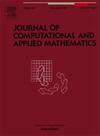pde约束最优控制的自适应正则化
IF 2.1
2区 数学
Q1 MATHEMATICS, APPLIED
Journal of Computational and Applied Mathematics
Pub Date : 2025-03-28
DOI:10.1016/j.cam.2025.116651
引用次数: 0
摘要
有 PDE 约束的最优控制问题需要正则化来确保良好拟合,引入的微小扰动使得精确近似解具有挑战性。我们提出了一种将正则化和离散化自适应性结合起来的有限元方法,根据严格的后验误差估计局部改变正则化参数和网格大小,旨在动态平衡诱导的正则化和离散化误差,为解决这些问题提供一种稳健高效的方法。我们通过几个数值实验证明了我们分析的有效性。本文章由计算机程序翻译,如有差异,请以英文原文为准。
Adaptive regularisation for PDE-constrained optimal control
PDE-constrained optimal control problems require regularisation to ensure well-posedness, introducing small perturbations that make the solutions challenging to approximate accurately. We propose a finite element approach that couples both regularisation and discretisation adaptivity, varying both the regularisation parameter and mesh-size locally based on rigorous a posteriori error estimates aiming to dynamically balance induced regularisation and discretisation errors, offering a robust and efficient method for solving these problems. We demonstrate the efficacy of our analysis with several numerical experiments.
求助全文
通过发布文献求助,成功后即可免费获取论文全文。
去求助
来源期刊
CiteScore
5.40
自引率
4.20%
发文量
437
审稿时长
3.0 months
期刊介绍:
The Journal of Computational and Applied Mathematics publishes original papers of high scientific value in all areas of computational and applied mathematics. The main interest of the Journal is in papers that describe and analyze new computational techniques for solving scientific or engineering problems. Also the improved analysis, including the effectiveness and applicability, of existing methods and algorithms is of importance. The computational efficiency (e.g. the convergence, stability, accuracy, ...) should be proved and illustrated by nontrivial numerical examples. Papers describing only variants of existing methods, without adding significant new computational properties are not of interest.
The audience consists of: applied mathematicians, numerical analysts, computational scientists and engineers.

 求助内容:
求助内容: 应助结果提醒方式:
应助结果提醒方式:


